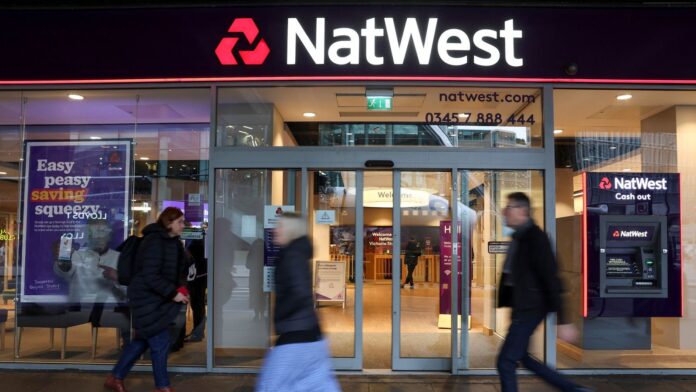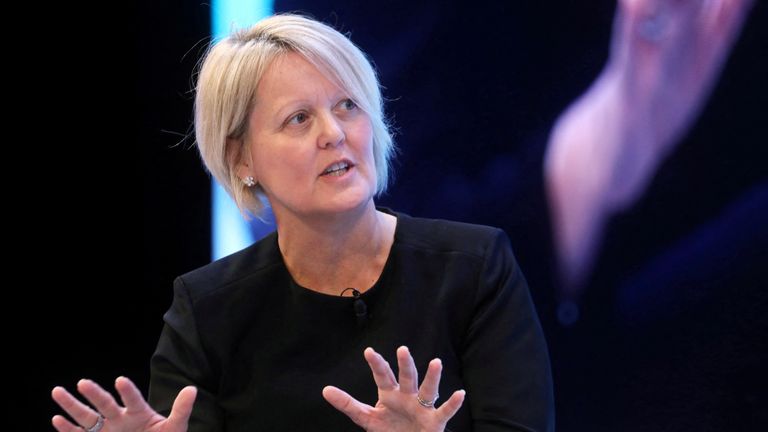NatWest has an increasingly confident air about it.
The biggest lender to small and medium-sized businesses in the UK today posted another set of results that were better than expected – and raised its profit forecasts for the year.
It also announced an eye-catching acquisition – agreeing to pay up to £2.4bn in cash for a £2.5bn portfolio of 10,000 household mortgages from Metro Bank.
News of the acquisition comes barely a month after NatWest agreed to buy most of Sainsbury’s Bank, bringing it an estimated one million new accounts and a book of unsecured loans to the sum of £2.5bn.
Money latest: What’s going on in the mortgage market?
Those deals paint a picture of a lender very much in expansion mode.
First, the numbers. NatWest, which serves 19 million customers, separately reported an operating profit before tax of £3bn for the first six months of 2024.
That was down nearly 16% on the same period last year but was no surprise given the intense competition in both the mortgage market and the savings market – with customers shopping around for better rates in increasing numbers.
Lloyds Banking Group reported something similar earlier this week.
Accordingly, the net interest margin (NIM) – the spread between what NatWest pays depositors and charges borrowers – fell to 2.07% from 2.23% in the same period last year.
What did come as a pleasant surprise to investors, though, was that the NIM for the three months to the end of June, at 2.1%, was actually ahead of the 2.05% achieved during the first three months of the year.
Other pleasant surprises in the results included a drop in the impairments made by the bank against loans it does not now expect to be repaid in full from £223m last year to £48m and return on tangible equity (RoTE – a measure of a company’s ability to generate profits) which came in at 16.4% for the half-year – down from 18.2% in the same period last year but still ahead of expectations. RoTE for the three months to the end of June was also better than the first three months of the year.
The results come a year to the day since Dame Alison Rose stepped down as chief executive following the so-called debanking row with Reform UK leader Nigel Farage.
Her successor, Paul Thwaite, inherited a bank in good shape, as was shown by the full year results for 2023 published in February.
That momentum has been maintained. Mr Thwaite reeled off a strong of statistics to point to progress, including news of 200,000 more customers and a rise in the bank’s share of the credit card market from 8.5% to 9%.
He said there was evidence that customers were saving more, with deposits rising by £6bn during the period, while lending grew by £3bn in commercial banking.
Mr Thwaite also said there were few signs of stress despite millions of homeowners moving to higher mortgage rates over the last couple of years.
He added: “Customers are absorbing the impact of higher interest rates and arrears remain low.”
Indeed, they actually appear to be paying down their mortgage debt where possible: Katie Murray, the chief financial officer, said that, although gross new mortgage lending during the three months to the end of June was up 20% on the first three months of the year, mortgage balances fell by £0.8bn due to mortgage redemptions.
Less glamorous is the work being done to increase productivity at the bank. Mr Thwaite said NatWest had cut the number of telephony channels it uses from 20 to five and was shutting one of its three strategic hubs.
With the half year dividend being raised by 9%, shares rose by more than 6%, taking them to a level not seen since February 2015 and gives NatWest a market value of £28.2bn.
Of course, while a lot of this progress is down to self-help by NatWest, it must never be forgotten that banks, when all is said and done, are leveraged plays on the economies in which they operate.
A healthy bank reflects a healthy economy – which is one reason why the bank today raised its profit forecasts. It expects a modest increase in both GDP growth and unemployment and also anticipates inflation remaining at close to the current 2%.
Ms Murray said: “Overall the UK economy has performed better than we expected at the start of the year and we are pleased to see consumer and business confidence returning.”
She said NatWest was assuming interest rates would start to come down at some point during the next three months, falling to 4.75% from the current 5.25% by the end of the year, with five interest rate cuts expected next year – taking Bank Rate to 3.5% by the end of 2025.
She said that, as the bank’s economic scenarios were relatively stable, it was expecting a lower loan impairment rate during the second half of the year.
If there was a blemish on today’s results, it was a £24m hit related to the planned “Tell Sid” sale of the government’s remaining stake in the bank – a legacy of the bailout of the old Royal Bank of Scotland during the global financial crisis.
The stake now stands at 19.97%, down from a peak of 84.9% in December 2009. The planned sale was pulled in May, when Rishi Sunak unexpectedly called an early general election, but not before adverts were filmed starring the former newsreader Sir Trevor McDonald.
A sale of the stake to institutional investors is now expected instead and Mr Thwaite said he expected an update from Rachel Reeves, the new Chancellor, in due course.
Pointing out that the Treasury had almost halved its stake from 38% as recently as December last year, Mr Thwaite stressed this was a decision for the government, but added: “Returning the bank into private hands, I believe, is in the best interest of all of our shareholders.”
Some will wonder whether the acquisitions of both Sainsburys Bank and the Metro Bank mortgage portfolio are defensive – pointing to a lender looking to expand market share because organic growth is going to be harder to come by.
Mr Thwaite refuted this today: “We’re pleased with the two acquisitions. They are both accretive to earnings per share in year one and they feel like attractive things to do – both to build scale but also returns immediately for shareholders.”
Read more from Sky News:
Fuel prices remain a rip-off, regulator declares
Delivery firm could be sold for £2.7bn
Biggest US tech sell-off for over a decade
The acquisitions may also raise concerns that NatWest becomes even more dependent on net interest income – on which it relies more heavily than rivals such as Barclays.
But again Mr Thwaite refuted this: “You can see that we have grown our non net interest income in the quarter – it’s up 9% – and you can see growth in payments, in our lending fees, in our FX, in our assets under management and, strategically, I want to grow our fee income.”
Expect those questions about organic growth to continue to crop up in future – and especially as the Bank of England begins to cut interest rates.
For now, though, the lender – which for more than a decade financial journalists have been almost contractually obliged to preface with the word ‘troubled’ – has a spring in its step.



